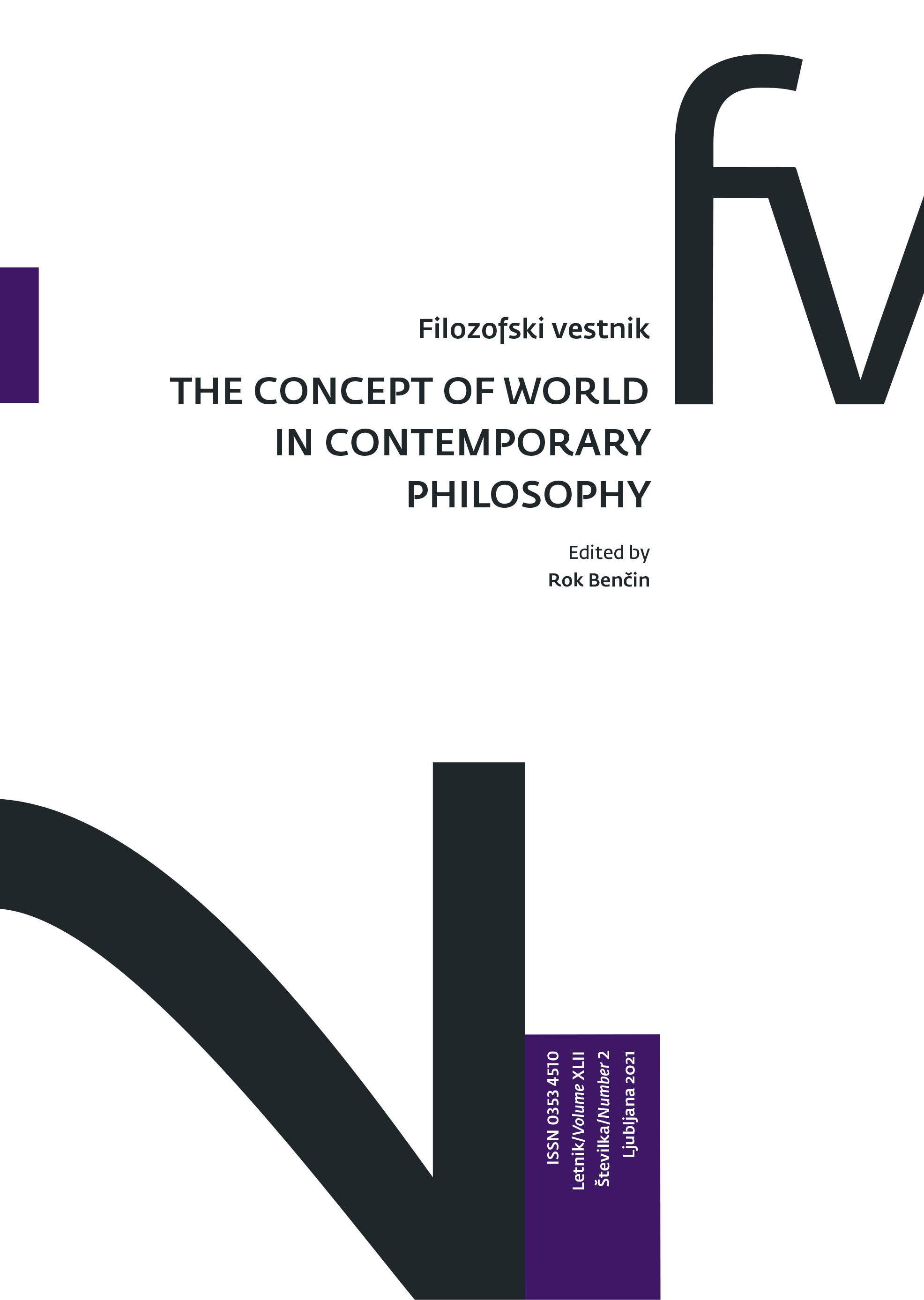Svet: mučna zgodovina neizogibnega para-koncepta
Prvi del: predzgodovina »sveta«
DOI:
https://doi.org/10.3986/fv.42.2.02Ključne besede:
svet, totaliteta, singularnost, kozmogonija, filozofija narave, nedoločenost, neskončnost, Aristotel, PlatonPovzetek
Svet ne obstaja od nekdaj. Vsaj ne v filozofiji. Članek v dveh delih bo raziskal kompleksen preplet konceptov, sredi katerega se je pojavila ideja sveta, in analiziral njene značilnosti, ki ji omogočajo igrati osrednjo vlogo v prostoru filozofije. Tu gre predvsem za dve potezi. Prvič, njena zmožnost definirati idejo zaprte, urejene totalitete (klasična ideja kozmosa), pri čemer spodkopava konsistenco slednje in odpira filozofski prostor za pozitivno rabo ideje nedoločenosti. Drugič, njena zmožnost vnašati zmedo v nekatere dobro urejene filozofske sisteme. V njih deluje kot nejasna točka brez jasnosti in razločnosti, ki ju običajno zahtevamo od filozofskih konceptov, a obenem pridobi preveliko težo, da bi jo iz filozofije izgnali. Pričujoči prvi del članka rekonstruira nekatere od koordinat, znotraj katerih se pojavi problematični pojem sveta. Načrtovani drugi del bo raziskal osrednjo vlogo, ki jo ideja sveta odigra v sodobni filozofiji, ko omogoči novo artikulacijo med idejo univerzalnega in idejo totalitete. To proizvede cel niz posledic, med njimi pa gre izpostaviti predvsem novo artikulacijo ideje subjekta in razmerja med filozofijo in prakso.
Prenosi
Literatura
Aristote, Métaphysique, trans. J. Tricot, Paris, Vrin, 1991.
Aristote, Catégories, trans. J. Tricot, in Organon, Paris, Vrin, 1994.
Aristotele, Fisica, trans. L. Ruggiu, Milano, Rusconi, 1995.
Aristotele, Metafisica, trans. G. Reale, Milano, Bompiani, 2000.
Aristotle, Metaphysics, Volume I, trans. H. Tredennick, Cambridge, MA, Harvard University Press, 1933.
Aristotle, The Complete Works of Aristotle, The Revised Oxford Translation. One Volume Digital Edition, J. Barnes (ed.), Princeton, Princeton University Press, 2014.
Aristotle, Categories, trans. J. K. Ackrill, in The Complete Works of Aristotle.
Aristotle, Metaphysics, trans. W. D. Ross, in The Complete Works of Aristotle.
Aristotle, On the Heavens, trans. J. L. Stocks, in The Complete Works of Aristotle.
Aristotle, Physics, trans. R. P. Hardie and R. K. Gaye, in The Complete Works of Aristotle.
Aubenque, Pierre, Le problème de l’être chez Aristote, Paris, PUF, 1962.
Diels, Hermann and Walther Kranz, I presocratici, G. Reale (ed.), Milano, Bompiani, 2006.
Georgescu, Simona, “The World as a Yawning Gap. New Insights into the Etymology of Lat. Mundus ‘World’”, in N. Holmes, M. Ottink, J. Schrickx and M. Selig (eds.), Lemmata Linguistica Latina: Vol. 1. Words and Sounds, Berlin and Boston, De Gruyter, 2020, pp. 207–223.
Johnson, Monte Ransome, “Aristotle on Kosmos and Kosmoi”, in P. S. Horkey (ed.), Cosmos in the Ancient World, Cambridge, Cambridge University Press, 2019, pp. 74–107.
Plato, Timaeus, trans. R. G. Bury, in Plato in Twelve Volumes, vol. 9, Cambridge, MA, Harvard University Press, 1929.
Plato, Republic, trans. P. Shorey, in Plato in Twelve Volumes, vol. 5 and 6, Cambridge, MA, Harvard University Press, 1978.
Platone, Tutti gli scritti, G. Reale (ed.), Milano, Bompiani, 1991.
Platone, La Repubblica, trans. R. Radice, Milano, Bompiani, 2009.
Prenosi
Objavljeno
Verzije
- 2022-04-06 (2)
- 2021-12-31 (1)
Kako citirati
Številka
Rubrike
Licenca
Avtorske pravice (c) 2021 Avtorji

To delo je licencirano pod Creative Commons Priznanje avtorstva-Nekomercialno-Brez predelav 4.0 mednarodno licenco.
Avtorji jamčijo, da je delo njihova avtorska stvaritev, da v njem niso kršene avtorske pravice tretjih oseb ali kake druge pravice. V primeru zahtevkov tretjih oseb se avtorji zavezujejo, da bodo varovali interese založnika ter da bodo povrnili morebitno škodo.
Podrobneje v rubriki: Prispevki





